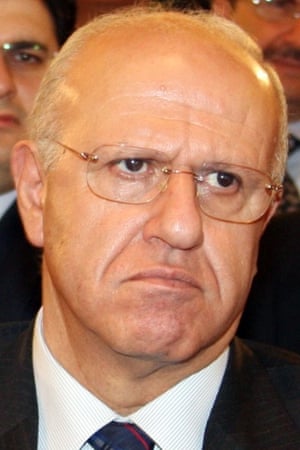The Guardian
Link

Throughout the intertwined history of Lebanon and Syria there have been several recurring themes. One has been the willingness of Lebanese leaders to do the bidding of their masters in Damascus; another is the role that Syria has allegedly played in stirring chaos at will.
Both were on rare public display in the Lebanese judicial system on Wednesday, when the former government minister Michel Samaha was convicted at trial of bringing bombs to Beirut – allegedly supplied by Syrian security chief Ali Mamlouk and intended to assassinate political and religious figures.
The conviction of Samaha places Mamlouk, a key figure in the Assad regime’s intelligence apparatus, at the heart of an alleged conspiracy to sow sectarian chaos in Lebanon.

The verdict marks the first time that any Syrian official has been formally linked to a terrorism charge by a Lebanese court or any international court, and sharply undercuts Syria’s claim to be a bulwark against regional terror.
Samaha’s confessions secured his conviction. He told the Lebanese military tribunal that he had transported the explosives in the boot of his car from Damascus. They had been given to him, he claimed, by a senior officer named Adnan, who was working for Mamlouk.
“Adnan put [them] in the car and Mamlouk knew,” Samaha told the hearing. “But I only planned to secure the provisions [ie the explosives] only and not to select targets.”
Mamlouk has also been indicted in the case, and the tribunal ordered a separate trial for him that is unlikely to move forward since he will not be handed over by Syrian authorities. It accused Mamlouk of providing Samaha with explosives that were to be used to carry out acts of homicide and terrorism.
He was arrested in his home in Beirut in August 2012 after a friend, who was a police informant, taped incriminating conversations. Ashraf Rifi, who was head of the internal security branch that carried out the sting, told the Guardian that the former information minister had transported 20 explosive devices from the Syrian capital, including magnet bombs that could be attached to cars.Samaha was charged with conspiring with Mamlouk to commit crimes against the state and the attempted murder of politicians, members of parliament and religious figures.
Samaha was sentenced to four-and-a-half years in prison, a verdict mocked by anti-Syrian politicians but lauded by others in Lebanon as a precedent in a country where political assassinations and plots usually go unpunished. In the early months of Syria’s war, Samaha had been a regular fixture in Damascus, briefing visiting officials and journalists about an imminent danger in Lebanon posed by jihadi plotting bombing campaigns.
In recent days Mamlouk’s fate has been the subject of considerable speculation, after he was reported to have been placed under house arrest due to suspicions that he was plotting a coup. The rumours have been seen as a sign of internal rifts in a regime that has been fighting to retain its hold on power for four years. In an apparent attempt to refute the rumours, Mamlouk appeared alongside President Bashar al-Assad in a meeting with Iranian parliamentarians on Wednesday, Syrian state TV reported.
Syria has long considered itself as Lebanon’s patron. Its direct tutelage ended in 2005 after the assassination of former Lebanese premier Rafik Hariri in a car bombing. An international tribunal in The Hague is currently hearing evidence alleging that Syrian officials may have also played a role in the assassination. Five members of Hezbollah, which is staunchly backed by Damascus, are on trial in the case.
Mamlouk’s alleged role in fomenting regional unrest has also come under scrutiny in the past, as the flow of foreign fighters from Syria to Iraq during the US occupation continued unabated through his reign as director of general intelligence.
He made a surprise appearance at a meeting with a US delegation in Damascus in early 2010, saying that cooperation against terrorism was contingent on better relations and the lifting of economic sanctions, according to a diplomatic cable published by WikiLeaks.
In the meeting, Mamlouk boasted that Syrian intelligence had successfully penetrated terrorist groups, saying: “In principle, we don’t attack or kill them immediately. Instead, we embed ourselves in them and only at the opportune moment do we move.”

No comments:
Post a Comment